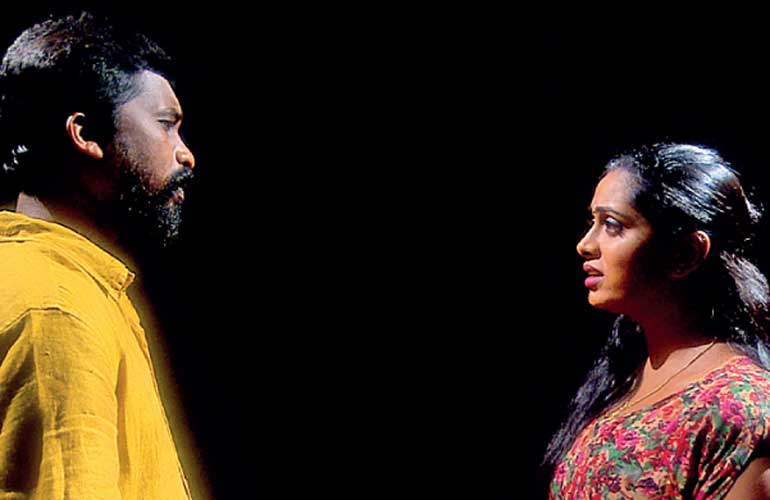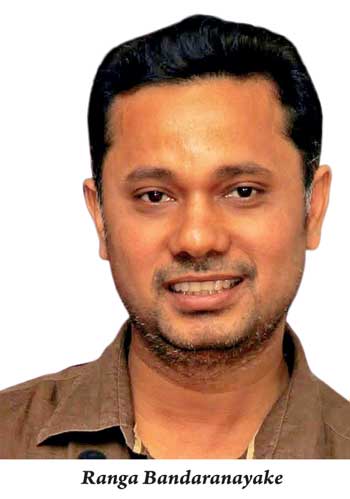Monday Feb 16, 2026
Monday Feb 16, 2026
Saturday, 29 October 2022 00:00 - - {{hitsCtrl.values.hits}}

A shot from For You, The Disappeared
A shot from Milk Rice A scene from Milk Rice (Elhale kiribath)
A scene from Milk Rice (Elhale kiribath)
- The international festivals are not merely a platform to feature our work, but they are also tools which enable strong dialogues on visual media of all forms. They are essentially bridges which bring creators and audience to one platform; Sri Lanka has a long way to go to achieve this kind of appreciation of arts and also to use art as a voice against social evils
- The hypocrisy of those in power and callousness of those who turn a blind eye to their misery is woven into the plot. His latest production, ‘For You, The Disappeared’ is an extension of this enduring crime against humanity
Television producer and feature-film maker Ranga Bandaranayake’s productions ‘Milk Rice’ and ‘For You, The Disappeared’ exploring the enduring agony of the families whose loved ones were forced to disappear were featured at the 2022 INPUT Television conference in Spain. Ranga was the only Sri Lankan artist to have been selected this year, to screen two of his works at this coveted television conference which has been globe-trotting since 1978.
 By Randima Attygalle
By Randima Attygalle
Watching Satyajit Ray’s Pather Panchali on his famous father-film-maker and dramatist Dharmasiri Bandaranayake’s projector at home is one of the earliest memories of Ranga Bandaranayake. Ranga made his debut as a child actor in his father’s landmarks of Hansa Vilak and Thunweniyama. Starting his journey as a television producer in 1995, Ranga has today made a name for himself as a versatile documentary and a feature film-maker committed to ‘social-centric’ creations, several of his work making it to international platforms.
Exposing social evils
A discarded entry form retrieved from a dustbin in 2018 opened the doors of the DetectiveFest International Film and Television Festival in Moscow, Russia for Ranga Bandaranayake. A casual reference to an entry form by an officer at the Sri Lanka Rupavahini Corporation (where Ranga works as a drama and a program producer), carelessly tossed aside, intrigued him to try his luck with his documentary, ‘Life without love – Love without life’. The plot woven around a Black Tiger member of the LTTE went to clinch a Jury Diploma at the festival in 2018.
In 2019 at the 21st edition of the festival DetectiveFest International Film and Television Festival Ranga’s documentary ‘Silence’ won the Golden Award for his exploration of ‘disappearance’ and the trauma of the loved ones who wait for their disappeared kith and kin to return. In the following year his short film ‘Cursed Memory’ won a Special Jury Diploma in the category of fighting for the civil society’s rights at the same festival.
A creative battle
Following these feats, Ranga’s short film, ‘Milk Rice’ (Elhale kiribath) and the documentary – ‘For You, The Disappeared’ were selected for the INPUT Television conference at Barcelona, Spain in May this year and Mini-INPUT Television Conference at Addis Ababa, Ethiopia a few weeks ago. Ranga shone in Barcelona as the only Sri Lankan artist to have been selected to screen two of his works at this coveted television conference. INPUT 2022 which was organised by the Audiovisual Cluster of Catalonia and Pompeu Fabra University in Barcelona, had 189 television and cross media production entries from across the world and among them 85 were selected and grouped into 26 sessions, moderated by some of the top in the industry.
INPUT, an international non-profit organisation of public television program makers and broadcasters, dedicated to television as public service and in the public interest. The INPUT Television conference is held annually to discuss and challenge the boundaries of public TV. The conference has travelled the world since 1978.
“My documentary ‘Silence’ helped me gain insights into the common agony of countless parents, spouses, siblings, children and friends; about their frustration, anger and bitterness towards a failed mechanism which has reduced to finding their loved ones, those who were forced to disappear, their memory reduced only to a photograph,” says Ranga. The hypocrisy of those in power and callousness of those who turn a blind eye to their misery is woven into the plot. His latest production, ‘For You, The Disappeared’ is an extension of this enduring crime against humanity.
The 23-minute documentary, (the script of which is by Chamara Prasanna Kodithuwakku), is a review of the ‘Families of the Disappeared’ organisation’s tireless struggle in finding a solution to this unresolved issue, while retaining its historic role. The documentary is rendered voices of the Chairman of the ‘Families of the Disappeared’ – Brito Fernando (producer of the documentary), Chairman of the Asian Human Rights Commission – Basil Fernando and Civil Rights Activist Prof. Chandraguptha Thenuwara, who resonate collectively that despite Sri Lanka having lost more than 200,000 lives from all ethnic groups, due to enforced disappearances and is still grieving, the authorities have failed to stop acts of enforced disappearance, failed to undertake criminal investigations into complaints and failed to prosecute those responsible. Both state and anti-government rebel groups are responsible for the disappearances in the north and south of the country. The documentary also underscores that it is a struggle to keep pushing for accountability in the country given what they see as official indifference or outright obstruction. Several Commissions of Inquiry have been appointed by successive governments since 1990. Altogether they received around 80,000 complaints according to the official statistics and more than half were considered strong enough for further investigation, the political mechanism has miserably failed to bring perpetrators before justice.
The monument for the Disappeared at Raddoluwa junction in Seeduwa which was formally opened on 4 February 2000 as a tribute to those who have ‘no grave’ as an epitaph on it proclaims, becomes a motif throughout the documentary.
An enduring social infliction
Ranga’s direction of the short film ‘Milk Rice’, the script of which is credited to Chamara Prasanna Kodithuwakku, which was also acclaimed in Spain is a paradoxical treatment of his central auspicious symbol of ‘milk rice’ which is juxtaposed with dismal emotions of loved ones pinning for their disappeared sons and siblings.
The people in the village see Wijesinghe (played by Chandrasoma Binduhewa) as an eccentric. His community sees him as a tough fighter of left-leaning politics, while at home he is a highly sensitive man. Wijesinghe lives with his wife (Menike Attanayake) expecting that at any moment his son, missing since the youth struggle in 1988-89, will come back. They prepare creamy delicious milk rice on every New Year’s Day and hope their son will return any day to enjoy it with them. Anjalee (N. Theebadarshani), a Tamil girl, is a boarder in one of their rooms, and is treated as family. She also lives in the hope of finding her brother, who disappeared during the civil war in 2009. Wijesingha and his wife long to see the face of their missing son, while Anjalee dreams of being reunited with her long missing brother. The director’s treatment of the film is an index that the enduring social affliction of disappearance transcends ethnicity and strikes a common emotional chord.
Creativity for social justice
Ranga who counts considerable exposure at international television and film festivals as a script writer, director/producer as well as a jury member is critical of nepotism at certain local exercises and laments the lack of social discourse on art and theatre here at home. “The international festivals are not merely a platform to feature our work, but they are also tools which enable strong dialogues on visual media of all forms. They are essentially bridges which bring creators and audience to one platform; Sri Lanka has a long way to go to achieve this kind of appreciation of arts and also to use art as a voice against social evils,” reflects Ranga who attributes his creative gene and nerve as an artist to his father. “My father has always been vocal about social evils which permeate the Sri Lankan fabric. I have taken a cue from him for which I have not been so popular in certain quarters,” says Ranga whose bold work has triggered even life threats. “My father has always set the example of standing for what is right and to be sincere to the creation at hand which continues to be my mantra as well.”
Ranga's tour was sponsored by Goethe Institute.